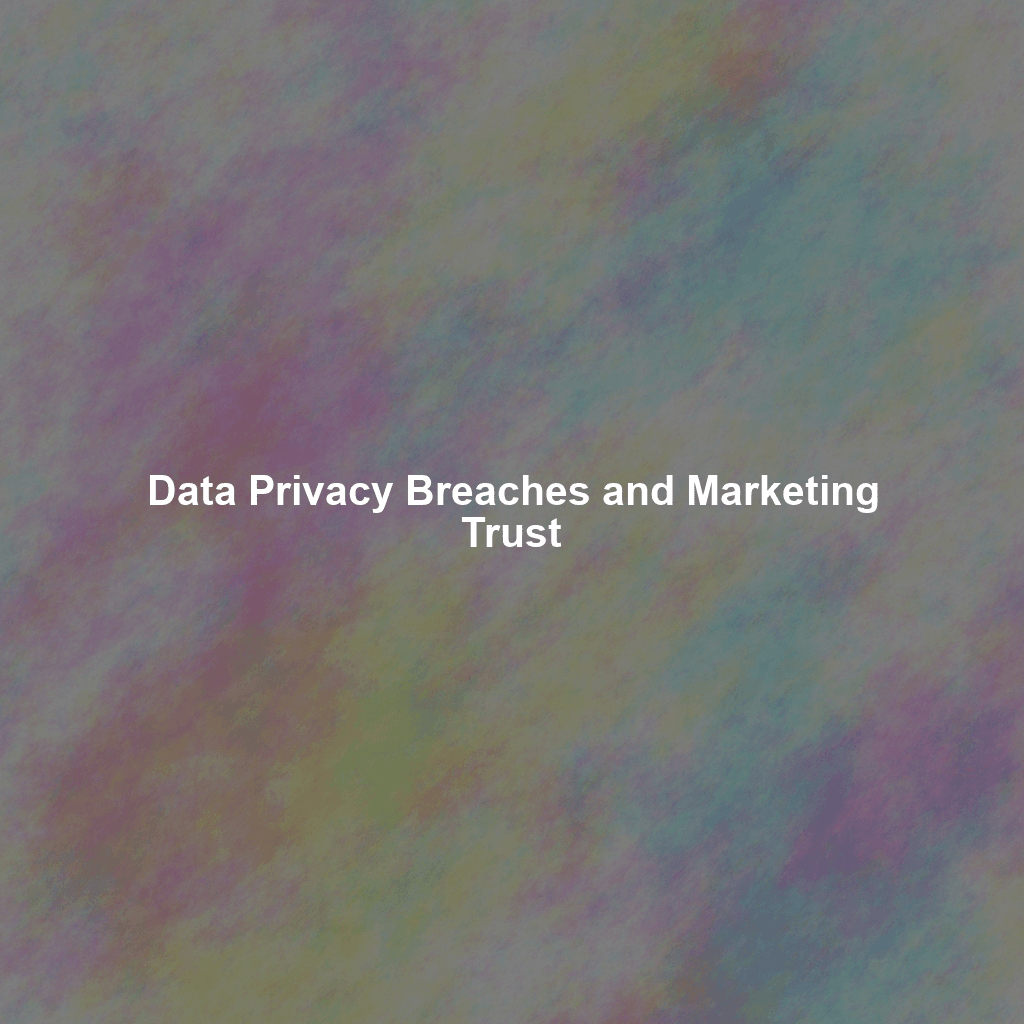In the relentless pursuit of viral marketing moments, those catchy slogans and seemingly innovative (but potentially intrusive) data tactics, marketers often tread a perilously thin line.
Lurking beneath even the most innocuous marketing endeavors is a potential catastrophe: data privacy.
While minor marketing missteps might lead to temporary embarrassment, a full-blown data privacy breach plunges a brand into a far deeper abyss, triggering severe and enduring consequences that directly erode consumer trust and decimate a brand’s painstakingly built reputation.
The Grim Reality of a Data Privacy Breach
Stripped of marketing jargon, a data privacy breach occurs when personal information is accessed or disseminated without the explicit consent of its rightful owner. This information spans a wide spectrum, from seemingly benign details like email addresses and names to highly sensitive data such as credit card numbers, confidential medical records, and critical identifiers like social security numbers. These breaches can manifest through several damaging pathways:
- Hacking (The Digital Infiltration): Malicious actors, the cyber equivalent of thieves, exploit vulnerabilities in your digital infrastructure to illicitly steal sensitive data. For more on cyber threats, resources from the Cybersecurity and Infrastructure Security Agency (CISA) offer valuable information.
- Insider Threats (The Breach of Trust): Employees within your organization, whether driven by malicious intent or sheer negligence, compromise data security protocols, leading to unauthorized access or disclosure.
- Phishing (The Deceptive Ploy): Scammers and cybercriminals employ deceptive tactics to trick unsuspecting individuals into divulging their confidential information. Educational materials on phishing are available from the Federal Trade Commission (FTC).
- Accidental Leaks (The Incompetence Catastrophe): Data inadvertently falls into the wrong hands due to human error or inadequate security safeguards.
- Vendor Vulnerabilities (The Third-Party Risk): Security weaknesses within third-party vendors who have access to your data can create a backdoor for breaches. Understanding third-party risk management is crucial (NIST Small Business Cybersecurity on Third-Party Risks).
Regardless of the specific mechanism, a data breach invariably incurs costs far exceeding the immediate remediation efforts and legal fees. The truly devastating impact lies in the profound erosion of trust that ensues when customers realize their personal information was not secure under your stewardship.
The Systemic Destruction of Marketing Trust by Breaches
Trust is the fundamental cornerstone of any effective marketing strategy. Customers exhibit a significantly higher propensity to engage with brands they perceive as transparent, reliable, and, critically, committed to safeguarding their privacy. A data privacy breach doesn’t merely erode this trust; it shatters it into irreparable fragments, triggering a cascade of severely negative consequences:
- Customer Exodus (The Great Departure): Customers are likely to abandon a brand that has mishandled their sensitive data, actively seeking out competitors perceived as more trustworthy and secure. Brand loyalty evaporates when security is compromised.
- Viral Negative Publicity (The Reputation Meltdown): Dissatisfied customers, particularly those whose privacy has been violated, are highly inclined to share their negative experiences, amplifying the damage to your brand’s public image. Negative word-of-mouth can be catastrophic in the digital age.
- Marketing Avoidance (The Defensive Reaction): Consumers may develop a genuine apprehension towards interacting with your marketing initiatives or providing any personal information if your brand has a history of data breaches. Fear acts as a powerful deterrent to engagement.
- Overall Credibility Loss (The Tarnished Brand Halo): A data breach can inflict severe damage on your brand’s overall image and credibility, making it exceedingly challenging to attract new customers and even more difficult to retain existing ones. Trust is a precious commodity, arduous to acquire and easily squandered.
- Severe Financial Repercussions (Beyond Remediation Costs): In addition to the direct expenses associated with addressing the breach, companies face the risk of substantial fines and legal penalties for non-compliance with data privacy regulations, such as the General Data Protection Regulation (GDPR) in Europe and the California Consumer Privacy Act (CCPA) in the United States. These financial penalties can be crippling.
Fundamentally, a data privacy breach transforms your brand in the eyes of consumers from a trusted partner into a perceived threat. Rebuilding that lost trust is a protracted and arduous undertaking with no guaranteed success.
Real-World (Hypothetical, Yet Plausible) Horror Scenarios
While news outlets frequently report on actual data breaches, underscoring the critical importance of data privacy, examining a few hypothetical yet chillingly realistic scenarios can further illustrate the potential devastation:
Case Study 1: TechGadgets Inc. – The Phishing Attack’s Unraveling
TechGadgets Inc., a popular online electronics retailer, fell prey to a sophisticated phishing campaign. Cybercriminals, impersonating the company’s CEO through highly convincing emails, successfully manipulated employees into revealing their login credentials. This unauthorized access granted the attackers unfettered entry to sensitive customer data, including credit card details, home addresses, and purchase histories. The ensuing public outcry was immediate and severe, leading to a significant decline in sales, a wave of lawsuits, and lasting, irreparable damage to the company’s once-sterling reputation. Customers who were previously enthusiastic about purchasing the latest gadgets became deeply apprehensive about entrusting their personal information to a company that demonstrated an inability to secure its own internal systems.
Case Study 2: HealthFirst Clinic – The Insider Threat’s Exposure
A disgruntled employee at HealthFirst Clinic, a seemingly reputable local healthcare provider, deliberately downloaded and disseminated thousands of private patient records to an unauthorized third party. This egregious breach exposed highly sensitive medical information, encompassing diagnoses, treatment plans, and insurance details. The clinic faced immediate and substantial fines for violating HIPAA regulations, and patients experienced a profound erosion of trust in the organization’s capacity to protect their most personal information. Consequently, a significant number of patients opted to transfer their medical care to other clinics, unable to reconcile the breach with the fundamental expectation of medical privacy within a healthcare setting.
Case Study 3: GlobalTravel Agency – The Third-Party Vendor Nightmare
GlobalTravel Agency, a well-known travel booking platform, outsourced its customer service operations to an overseas vendor in an effort to reduce operational costs. Unbeknownst to GlobalTravel, this vendor maintained alarmingly lax security protocols. Cybercriminals easily infiltrated the vendor’s inadequately protected systems and subsequently gained access to GlobalTravel’s extensive customer database, pilfering passport information, detailed travel itineraries, and frequent flyer numbers. This breach not only exposed customers to a significant risk of identity theft but also portrayed GlobalTravel as a negligent and untrustworthy entity for failing to adequately vet its service providers. The company faced a protracted and challenging recovery process as customers questioned GlobalTravel’s basic due diligence practices regarding its own vendors.
These hypothetical scenarios, while fictional constructs, paint a starkly realistic picture of the diverse ways in which data privacy breaches can occur and the potentially devastating consequences they can inflict on marketing trust and a brand’s overall standing in the eyes of consumers.
The Arduous Path to Rebuilding Trust After a Breach
Even in the aftermath of a data privacy breach, complete and utter despair is not necessarily the only outcome. Brands can undertake deliberate and meaningful steps in an attempt to rebuild trust and regain the shattered confidence of their customer base. However, it is crucial to understand that this is a long-term endeavor, demanding sustained commitment and demonstrable action.
- Embrace Transparency and Accountability: Communicate openly and honestly with your customers about the specifics of the breach. Avoid downplaying the severity of the incident or attempting to deflect blame. Acknowledge the organization’s failure and clearly articulate the precise steps being taken to rectify the situation.
- Act Decisively to Contain and Remediate: Take swift and decisive action to contain the breach, conduct a thorough investigation to determine the root cause, and implement robust and verifiable measures to prevent any recurrence. This may necessitate engaging external cybersecurity experts, making significant upgrades to your security infrastructure, and proactively informing all individuals whose data was compromised.
- Offer Tangible Support and Remediation: Provide meaningful support to the affected customers. This could include offering complimentary credit monitoring services, identity theft protection, and financial compensation for any direct financial losses incurred as a direct result of the data breach.
- Invest Substantially in Robust Security Infrastructure: Demonstrate an unwavering commitment to data security by making significant financial investments in cutting-edge cybersecurity measures. This includes implementing advanced firewalls, intrusion detection and prevention systems, end-to-end encryption protocols for sensitive data, and engaging independent third-party cybersecurity firms to conduct regular and rigorous security audits and penetration testing.
- Integrate Privacy into the Organizational Culture: Make data privacy a core organizational value that permeates every facet of your operations. Proactively consider privacy implications in every decision-making process, from the initial stages of product development to the execution of every marketing campaign.
- Implement Rigorous and Ongoing Employee Education and Training: Conduct comprehensive and regularly updated training programs for all employees on data privacy best practices and the critical importance of adhering to security protocols. Emphasize the potential ramifications of data breaches, underscoring the fact that human error often represents a significant vulnerability in data security.
- Minimize Data Collection and Retention Practices: Adopt a policy of collecting only the absolute minimum amount of personal data that is strictly necessary for legitimate and clearly defined business purposes. Avoid the practice of hoarding data that is not actively being used, as this only amplifies the potential damage in the event of a security incident. Implement clear and well-defined data retention policies and ensure the secure disposal of data when it is no longer required.
- Establish Strong Data Governance Frameworks: Develop and meticulously document clear and comprehensive policies and procedures that govern how personal data is collected, stored, processed, used, and securely disposed of throughout its lifecycle within your organization. Clearly define roles and responsibilities for data handling and ensure accountability at all levels.
- Ensure Comprehensive Compliance with Data Privacy Regulations: Meticulously adhere to all relevant data privacy laws and regulations, including but not limited to GDPR, CCPA, and COPPA (if applicable to your business operations). Demonstrating a proactive commitment to regulatory compliance not only helps mitigate the risk of substantial fines and legal repercussions but also signals a commitment to protecting consumer privacy rights. Information on compliance can be found on the websites of regulatory bodies like the UK Information Commissioner’s Office (ICO).
- Commit to Continuous Improvement and Vigilance: Recognize that data privacy is not a static state but an ongoing process that requires continuous monitoring of your security posture. Stay informed about emerging cybersecurity threats and proactively adapt your security measures and protocols to stay ahead of evolving vulnerabilities and maintain your customers’ trust over the long term.
Prevention as the Ultimate Strategy: Cultivating a Privacy-First Culture
While recovering from the significant damage of a data privacy breach is a possibility, it is infinitely more prudent and strategically sound to prioritize prevention and cultivate a deeply ingrained culture of data privacy across your entire organization from the outset.
- Establish and Enforce Robust Security Policies: Clearly define your company’s comprehensive data security policies and ensure that all employees thoroughly understand and strictly adhere to them. Regular communication and consistent reinforcement of these policies are absolutely crucial.
- Conduct Frequent and Thorough Security Assessments: Implement a schedule of regular and comprehensive security audits of your systems and processes to proactively identify potential vulnerabilities and address them before they can be exploited. Engaging independent cybersecurity experts to conduct thorough penetration testing can provide invaluable insights into your security posture.
- Implement Strong Authentication and Access Controls: Enforce the consistent use of strong, unique passwords and mandatory multi-factor authentication for all employee accounts to effectively prevent unauthorized access. Implement the principle of least privilege, granting employees only the minimum level of system access necessary to perform their specific job duties.
- Employ End-to-End Encryption for Sensitive Data: Implement robust end-to-end encryption protocols for all sensitive data, both when it is stored (data “at rest”) within your systems and when it is being transmitted (data “in transit”) across networks. This critical security measure helps to prevent unauthorized access to data even in the event of a security breach. Information on encryption technologies is available from the National Security Agency (NSA).
- Implement Real-Time Threat Detection and Monitoring Systems: Utilize advanced security tools and technologies to continuously monitor your systems for any suspicious activity or potential security threats and establish clear incident response protocols to promptly address any detected threats.
- Stay Informed About the Evolving Threat Landscape: Continuously educate your security team and all employees about the latest emerging cybersecurity threats, attack vectors, and best practices for prevention. Ensure that your security measures are proactively updated to address newly identified vulnerabilities and stay ahead of the evolving threat landscape.
By making data privacy a fundamental organizational priority and actively cultivating a security-conscious culture throughout every level of your company, brands can significantly reduce the risk of experiencing devastating data breaches and effectively safeguard their most valuable asset: the trust of their customers.
The Future of Trust: Privacy as a Key Competitive Differentiator
In an increasingly data-driven world where consumers are becoming ever more aware of and concerned about their fundamental privacy rights, brands that genuinely prioritize data privacy and demonstrably exhibit a strong and unwavering commitment to protecting customer data will gain a significant and sustainable competitive advantage in the marketplace. In the future, robust data privacy practices will transcend mere legal compliance; they will become a critical factor that heavily influences consumer purchasing decisions, fosters long-term brand loyalty, and builds enduring customer relationships.
By proactively putting privacy first in all aspects of their operations, marketers can cultivate stronger, more trustworthy, and ultimately more profitable relationships with their customers, ensuring long-term business success and preventing those seemingly minor “silly marketing mishaps” from escalating into the catastrophic reality of a damaging data privacy breach.
In Conclusion: Privacy Isn’t Just a Legal Obligation, It’s Smart Business Strategy
Data privacy breaches represent a significant and very real threat to hard-earned marketing trust and a brand’s overall reputation and long-term viability. While the temptation to collect and leverage as much consumer data as possible might be strong in the pursuit of marketing gains, the potentially devastating negative consequences of a data breach far outweigh any perceived short-term benefits or tactical advantages. By making data privacy a genuine and non-negotiable priority, investing strategically in robust and up-to-date security measures, and embracing principles of transparency and accountability in data handling practices, brands can effectively protect their customers’ valuable personal information, safeguard their painstakingly built reputation, and cultivate lasting trust. In the long run, taking data privacy seriously is not merely about complying with complex legal regulations – it is about making sound and strategic business decisions that foster enduring customer relationships, build brand loyalty, and ensure sustainable success in an increasingly privacy-conscious world.
 Skip to content
Skip to content

